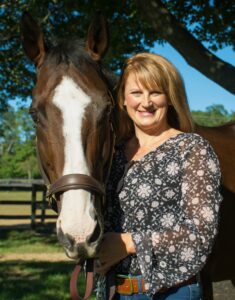
Dr. Carey Williams with her horse Mickie.
Each year, Rutgers hosts a Horse Management Seminar featuring invited speakers from New Jersey and across the U.S. on a wide range of topics in equine health, performance, and management. The seminar has traditionally been held on the second Sunday in February at the Rutgers Cook Campus. However, due to COVID-19 restrictions, the 2021 Horse Management Seminar was transitioned to a virtual format. Rather than having all talks in one full day, the seminar was split into three webinars held on the first three Mondays in February. Each week had a specific topic area (health, behavior, and nutrition) and featured two speakers as well as a live Q&A session.
The virtual 2021 Horse Management Seminar Series had outstanding attendance, with over 200 participants for each of first two installments and over 150 attendees at the final webinar. Attendees joined us from 39 U.S. states! The seminar series also reached an international audience, with participants from countries including Canada, Australia, Mexico, Peru, and Brazil! While we are looking forward to when we can again gather for in-person events, we are excited for the potential to reach new and expanded audiences of industry stakeholders and those interested in learning more about horse care and management through the use of virtual platforms. For the first webinar in the series, over 70% of participants completing the post-event evaluation indicated that it was their first time attending any event (either virtual or in-person) hosted by Rutgers Cooperative Extension or the Equine Science Center!
The first webinar on February 1st focused on the topic of Equine Health. Dr. Michael Fugaro, owner of Mountain Pointe Equine Veterinary Services, gave a presentation titled “Economical Veterinary Care” that highlighted the economic realities facing both veterinary practices and horse owners and discussed strategies for open communication with your veterinarian regarding finances and care of your horse. Dr. Lynsey Makkreel, Foundation Equine Wellness and Performance Veterinarians, followed with “Keeping Your Horse Sound”. This presentation reinforced the importance of a solid relationship between horse owners and equine professionals in ensuring horse soundness and discussed basic principles of trimming and shoeing as well as topics including saddle fit, horse fitness and riding surfaces/arena footing that all contribute to maintaining a sound equine athlete.
Equine Behavior was the topic area for the second webinar in the Horse Management Seminar series held on February 8th. This webinar featured Sara Malone, Ph.D., and Ellen Rankins, Ph.D. Candidate, both of Rutgers University, presenting on “Evaluating Horse Welfare”, which discussed how animal welfare principles apply to the performance horse and how to re-evaluate common horse management techniques to maximize equine welfare. Angelo Telatin, Ph.D., Delaware Valley University, then presented “Using Learning Theory to Train Horses” that focused on the importance of timing, accuracy, and deliberate application of aides to achieve a specific desired response in the horse and the importance of evaluating and correcting these factors if the horse is not giving the desired response or progressing in the training process.
The final installment of the seminar series was held on February 15th, with Burt Staniar, Ph.D., Penn State University, presenting on “Fiber and its Importance to Horses” and Krishona Martinson, Ph.D. University of Minnesota, on “Forage/Pasture Practical Research you can Use!”. Dr. Staniar’s talk discussed the difference between chemical and physical dietary fiber and the need to define fiber requirements for horses in order to promote optimal horse health. Dr. Martinson shared research on yield and nutritional differences between different forage types (warm-season vs cool-season grasses or legumes), effects of low-lignin alfalfa varieties on digestibility and the hindgut microbiome and impacts of hay storage methods on nutrient composition – results of these studies provide valuable insight for horse owners when selecting forages and feeding practices for their horses.
In post-program evaluations, attendees reported an increase in knowledge within in each of the topic areas following the webinars. 80% of attendees who completed the evaluation indicated that the information presented in the webinars would impact how they managed their farms or horses, with over 90% indicating they would implement or consider implementing some or all of the methods and recommendations presented in the webinars. The general responses from participants can be summed up by this comment from one evaluation: “I think everything went well! Great talks. Hope there is public access to recorded lectures. Definitely something to watch again.” There has been considerable interest in access to recordings of the webinars, and recordings will be made available for public viewing beginning in March on the Rutgers Equine Science Center’s YouTube page (https://www.youtube.com/c/RutgersEquineScienceCenter/videos)
We would like to thank our presenters for offering their time and the great information they provided in their talks as well as our attendees for their great participation and engagement during the events including asking so many great questions of our presenters during the Q&A sessions at the end of each webinar. We look forward to seeing all of you at future programs and events! If you are not yet on the Equine Science Center’s mailing list to get up to date information on when programs will be held you can join the list by going to their website: https://esc.rutgers.edu/ and sign up at the bottom of any page!

